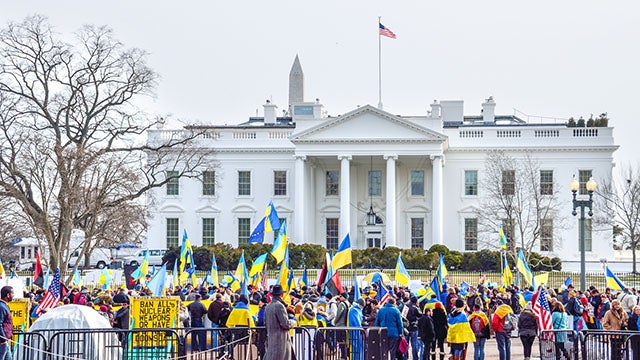[[nid:16649]]
Aspen Institute Society of Fellows members recently gathered for a symposium focused on the conflict between Ukraine and Russia, one of the most pressing global issues of the summer. Former US Ambassador to Ukraine William Green Miller (1993-1998), a senior policy scholar at the Woodrow Wilson Center, and Ukrainian doctor, psychiatrist, and civil society development expert Denis Poltavets, a medical doctor and psychiatrist, served as moderators during the three-day symposium in Aspen, CO. The discussion centered on the history of Ukraine’s ties to Russia, possible strategy solutions, and outlooks for the future. “This is a moment that requires wisdom, decision, and action,” said Miller.
Fellows and moderators deliberated over a possible diplomatic deal between Ukraine and Russia that included an arrangement around natural gas resources, and a possible partition between East and West Ukraine.
Foreign policy expert and Brookings Institute president Strobe Talbott and former US Deputy Secretary of Defense Ash Carter joined the Fellows to offer their thoughts on the situation. Both Talbott and Carter seemed confident that Russian President Vladimir Putin has a predictably expansionist approach regarding Ukraine and remains entangled in misguided perceptions about what’s best for Russia’s modern society.

“Putin is not crazy, but he believes untruths,” said Talbott. “He’s a CEO without a board of directors.” Talbott added that he believes Putin’s reigning era will be short-lived, as it appears he’s falling into a pattern of past Russian leaders’ mistakes: “All his policies are a resurrection of the policies that led to the fall of the Soviet Union,” Talbott said.
Yet Putin is still a worrisome figure for maintaining the integrity of international law, and both Carter and Miller urged for US intervention in the short term. “The earlier you react, the safer it is,” said Carter. Miller agreed: “We have a legal obligation to assist Ukraine… and to rectify the injustices that have been done.”
Still, the United States’ role in Ukraine is not as critical as those of Ukrainian and other European forces that will have to be the drivers of creating change and stability in the region, according to Carter. “We have influence but not control,” said Carter. “Exemplary democracies of the West have to do a better job of selling the values of democracy,” added Talbott.
In discussing diplomatic solutions, Talbott emphasized empathy due to longstanding Ukrainian-Russian ties. The moderators agreed that Ukraine’s capital, Kiev, was the birthplace for Russian civilization and therefore Ukraine can be seen as the “lost limb” of Russia. Regardless, Talbott said that these countries will not merge without major consequences.
“If Russians try to conquer Ukraine, it will set off an international and civil war,” Talbott said. “Nostalgia… you cannot make it the basis for how you plan for tomorrow.”

